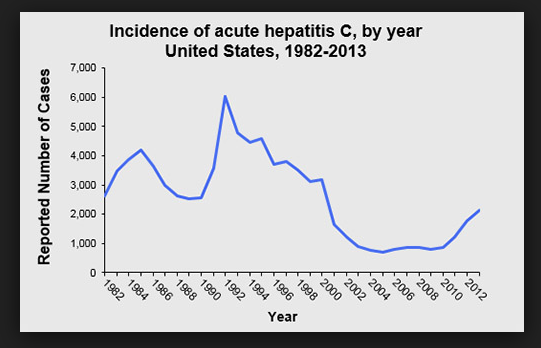 This one I saw this coming. And, it took no special foresight on my part. Others saw it too. It was virtually guaranteed, mostly due to the DEA s misguided attempt to control the very serious narcotic addiction problem in this country.
This one I saw this coming. And, it took no special foresight on my part. Others saw it too. It was virtually guaranteed, mostly due to the DEA s misguided attempt to control the very serious narcotic addiction problem in this country.
They really screwed it up. As I pointed out in my 2013 New York Post op-ed, New painful casualties of the drug war, the unintended consequences of placing hydrocodone (the narcotic found in Vicodin) on the most highly restricted Schedule II list (and similar measures) would outweigh anything that might be gained in controlling addiction.
They sure did. The graph below makes this obvious:

As narcotic pills became harder to get, addicts switched in droves to heroin, which is much cheaper to buy on the street. Note: The inflection point in 2010 reflects the time at which Purdue Pharma the makers of OxyContin came up with an effective abuse resistant formulation that made it very difficult to grind up and smoke or inject the drug. OxyContin abuse dropped like a rock, but heroin use skyrocketed.
And, it can be no coincidence that after years of decline, the rate of hepatitis C infection (transmitted primarily by needle sharing) also began to rise in 2010. (Source: CDC)

So, it is clear that restriction of narcotic pills drove addicts to switch to heroin, resulting in a huge leap in heroin deaths, and an increase in hepatitis C infections. (The situation with HIV is different, and far more complex. This is because, unlike HCV, it is also spread sexually. Furthermore, HIV medications are now used to reduce sexual transmission of the virus, making a direct comparison of the change in infection rates of the two viruses impossible.)
As bad as this is, the effect on patients who have a legitimate need for relief of moderate to severe pain is even worse. Addicts switched to heroin, but what about people who simply need narcotic analgesics for severe pain? Of course, they suffered the most. It was inevitable.
This is horrifyingly described in a recent Medpage Today article. One case that was documented by Rachel Gotbaum of Kaiser Health News was the cruel set of hoops that Chris Young, who owned a salvage yard in Maui, Hawaii had to jump through. As a result of a serious accident, Young suffered a severe spinal injury, which left him unable to walk, and in severe, chronic pain. Nothing will touch this pain except for narcotic analgesics, yet Young is forced to endure more than just pain. His pharmacy runs out of pills every month. They have a monthly allocation that is generally gone within the first week, leaving him with no choice except for a trip to the ER. In their zeal to fight an unwinnable battle against drug abuse, the DEA has placed a terrible burden on people who already have more than their share to deal with.
There is much more. Last year, a Florida pharmacy owned by Bill Napier, got a visit from the geniuses at the DEA, who wanted to find out why his narcotic sales weren t closer to the state average. Fearing legal action (despite doing nothing illegal) Napier was forced to cut his sales to an arbitrary number, which has left his customers with legitimate needs in a terrible place.
This is not limited to Hawaii or Florida. Dr. R. Sean Morrison, director of the palliative care program at Mount Sinai Hospital in New York says "What we've seen is dramatic reductions in our ability to provide appropriate care for our patients in pain.
Note the term palliative care. It refers to people that are dying or living in agony, many of whom require whatever dose of narcotics that will allow them to simply survive without suffering in a way that we would never permit for our pets.
So, the war on narcotics has driven people from pills to heroin, helped spread blood-borne infection, and caused needless suffering for people whose lives depend on powerful drugs just to survive with some level of comfort. Nice job. guys.
As I said when I concluded my Post op-ed: You don t punish patients to go after addicts or criminals. That s a pain our society should avoid.



